Myths about teaching can hold you back
- Year 9
- Year 9
Non-equally likely outcomes
I can state when outcomes will not be equally likely.
These resources will be removed by end of Summer Term 2025.
Switch to our new teaching resources now - designed by teachers and leading subject experts, and tested in classrooms.
These resources were created for remote use during the pandemic and are not designed for classroom teaching.
Lesson details
Key learning points
- Events with outcomes that are likely to not be equally likely can be identified
- Outcomes that are not equally likely can be identified and compared
- Factors can be identified that can cause one outcome to be more/less likely than another
Keywords
Event - An event is a subset of a sample space. It could be a particular outcome or be a set of outcomes that may occur from a trial.
Common misconception
The outcomes of a trial are always equally likely to occur (e.g. each of the two players in a tennis match are equally likely to win).
There are factors that may affect how likely one outcome is compared to another (e.g. the skill or experience of one tennis player compared to the other).
To help you plan your year 9 maths lesson on: Non-equally likely outcomes, download all teaching resources for free and adapt to suit your pupils' needs...
To help you plan your year 9 maths lesson on: Non-equally likely outcomes, download all teaching resources for free and adapt to suit your pupils' needs.
The starter quiz will activate and check your pupils' prior knowledge, with versions available both with and without answers in PDF format.
We use learning cycles to break down learning into key concepts or ideas linked to the learning outcome. Each learning cycle features explanations with checks for understanding and practice tasks with feedback. All of this is found in our slide decks, ready for you to download and edit. The practice tasks are also available as printable worksheets and some lessons have additional materials with extra material you might need for teaching the lesson.
The assessment exit quiz will test your pupils' understanding of the key learning points.
Our video is a tool for planning, showing how other teachers might teach the lesson, offering helpful tips, modelled explanations and inspiration for your own delivery in the classroom. Plus, you can set it as homework or revision for pupils and keep their learning on track by sharing an online pupil version of this lesson.
Explore more key stage 3 maths lessons from the Probability: possible outcomes unit, dive into the full secondary maths curriculum, or learn more about lesson planning.

Licence
Prior knowledge starter quiz
6 Questions
Q1.A __________ is a single predefined test.
Q2.What is an 'outcome'?
Q3.Complete the following sample space for the outcomes of the spinner. ξ = {A, I, R, T, }.
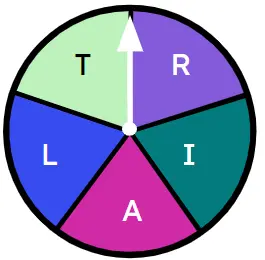
Q4.A regular six-sided dice is rolled once. In which sample space are the outcomes equally likely?
Q5.In which spinner are all the outcomes equally likely?
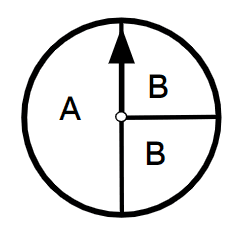
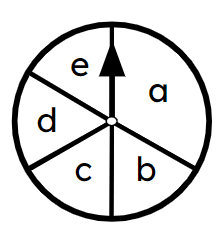
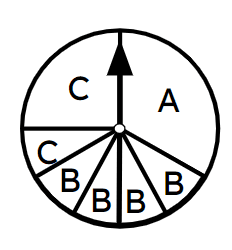
Q6.A regular six-sided dice is rolled once. Which outcome would be equally likely to rolling a multiple of 3?
Assessment exit quiz
6 Questions
Q1.An is a subset of a sample space.
Q2.Which statement is true for this spinner?
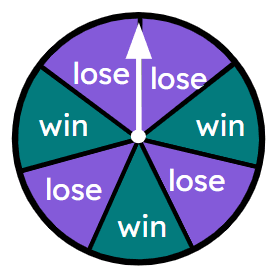
Q3.In which spinner is landing on 'win' more likely than landing on 'lose'?
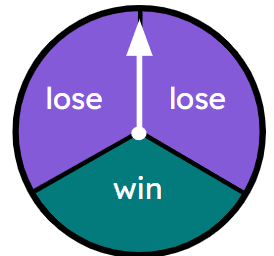
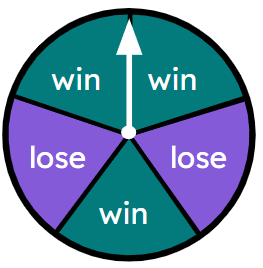
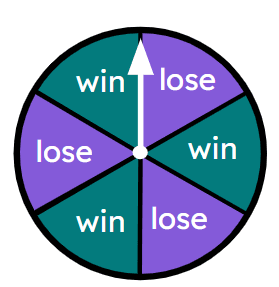
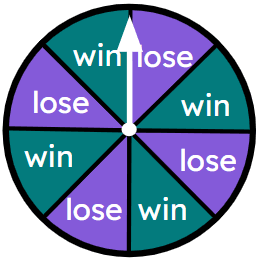
Q4.A counter is selected at random form the bag. Which letter is most likely to be selected?
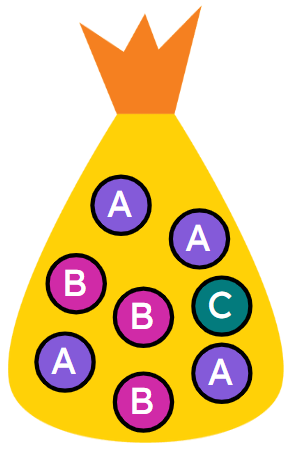
Q5.A counter is selected at random form the bag. Which letter is least likely to be selected?



